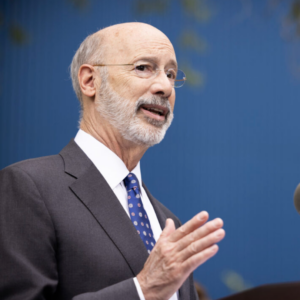In his final budget address to the state legislature, Gov. Tom Wolf proposed a $45.7 billion plan to increase general fund spending by $4.5 billion—a nearly 11 percent hike.
Wolf made the argument that the state should increase spending on education.
“Refusing to fund education equitably does not save us money,” he said. “It just means we wind up spending more on social services, remedial programs, even prisons. And that calculation doesn’t even take into account the opportunity costs of failing to invest in our kids: The skills our workforce doesn’t develop, the products and services that never become a reality, the business growth and tax revenues that vanish.”
Wolf said the state’s finances were in dire straits when he took office. But working with the legislature, Pennsylvania now enjoys a $2 to $$3 billion structural surplus.
“We’ve built our rainy day fund to more than $2.8 billion,” he said.
Wolf also proposed raising the state’s minimum wage from $7.25 to $15 an hour.
Delaware Valley Republicans accused Wolf of pushing a budget that creates future deficits.
“The spending includes billions of dollars from the federal government, so he wants to spend one-time monies for recurring situations, and when you do that, you create yourself a real problem in the out years,” said Sen. Bob Mensch (R-Bucks/Berks/Montgomery). He noted Wolf’s proposed new spending comes from $2 billion in federal American Rescue Plan (ARPA) funds. If enacted, it would produce a $1.3 deficit for the 2023-24 fiscal year, when Wolf will be out of office, Mensch said.
According to the Senate Appropriations Committee budget projections, the governor’s plan would produce a $1.3 billion deficit for the 2023-24 fiscal year and create an even bigger bill for Pennsylvania taxpayers to pay long after the governor leaves office: A $13 billion deficit by 2026-27.
“While he wants to leave a legacy of no taxes, he’s leaving a terrible legacy for the future because it will only increase costs to our taxpayers,” said Mensch.
“Bigger government, higher taxes, and increased spending are what the governor has proposed today,” said Rep. Tracy Pennycuick (R-Harleysville). “That is not the type of decision-making my constituents are asking of me. I am being asked to shrink government, hold the line on taxes and invest prudently in programs and services that have proven track records.”
Rep. Craig Williams (R-Chadds Ford), however, struck a more conciliatory tone.
“I was very glad to hear the governor spend several minutes from the outset of his speech reviewing our hard work to bring the commonwealth from a budget deficit to a budget surplus,” said Williams. “He also said some very favorable things about our Rainy Day Fund, created last year by the House. We have worked very hard to get our state’s financial condition in shape. As the governor noted, running a budget surplus now gives us an opportunity to invest in programs of great concern to all of us: education, health care, including mental health and addiction, and public safety.”
“Of course, the budget he offered runs out all of the state’s surplus and puts us back into a budget deficit,” Williams said. “So, I choose to see his budget as notional or a ‘wish list.’ I am confident that we will find middle ground during the budget process to bring relief to so many who continue to suffer, especially in light of the pandemic.”
Not surprisingly, Democrats praised Wolf’s budget.
“The governor’s proposed budget is exactly what Pennsylvania needs right now,” said Sen. John Kane (Chester/Delaware). “This budget uses our strong economic position to address the issues facing our communities: a $1.55 billion increase in funding for basic education, nearly $4 million to improve our public health infrastructure, and $14 million to expand SNAP benefits for individuals in need. It finally allocates the remaining American Rescue Plan funding into programs to serve the public. And, just like he has every year, the Governor has proposed a raise to our abysmal minimum wage.”
Kane added, “We can’t work for the people without investing in the people. That means supporting access to quality healthcare, a good education no matter the ZIP code, and common-sense policies that strengthen our economy from the bottom up. I look forward to working with the governor over the next few months to pass a budget that invests in Pennsylvanians.”
The House Democratic leadership released this statement: “Governor Wolf’s sound fiscal stewardship has resulted in a historic budget surplus while making thoughtful and targeted investments in education, infrastructure, and our workforce. A budget is a statement of priorities, and once again, the governor has shown that our first priority must be investing in both our pandemic recovery and our long-time growth.
“The governor’s vision for this budget mirrors many of the ideals we’ve been fighting for that will lead to better schools, better jobs, and a better Pennsylvania. Last year we took a historic step through the Level Up initiative to provide more resources to our most underfunded schools. This year, we look forward to continuing to work toward equity for all students as we invest in their futures from pre-K through postsecondary education.”
Follow us on social media: Twitter: @DV_Journal or Facebook.com/DelawareValleyJournal

